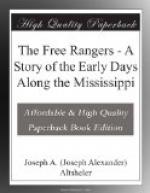“They can’t make much progress in this way,” said Adam Colfax to Henry, who had crept to his side.
“They can make it terribly wearing by keeping it up all night.”
“We can withdraw to the boats entirely and row away.”
“I wouldn’t do it. They’re sure to have boats, too, knowing that we could take to the water, and if we were to leave here they’d take it as a sign of victory and follow. Then we’d have another and worse fight.”
Adam Colfax was of the same opinion. He was not in favor of yielding an inch.
“I think I can see some of their figures dancing about there among the bushes,” he whispered to Henry.
“I see them, too,” replied the youth, “and I think that I see white men. They must be the desperate gang that followed Alvarez out of New Orleans.”
“No doubt of it.”
Adam Colfax presently crept down the river bank, but came back in a few minutes.
“Now we’ll see something,” he whispered to Henry, and what the cautious leader said was quick to come true.
The fire of both sides died for a moment, and then came a heavy crash and a jet of fire from the river; there was a long, shrill scream as a missile curved high over the white line and dropped in the red, where it burst, flinging red-hot pieces of steel in a shower. It was followed instantly by another report, another jet of fire, and another shower of metal in the bushes. The brass twelve-pounders on the boat had opened fire, and with shot after shot they were searching the dark thickets, whence cries of rage now came.
The Americans sent up shouts of triumph and redoubled their rifle fire. Many of the more zealous were eager to creep to the thickets and turn the defensive into the offensive, but the leaders restrained them.
“No use to waste life in any such foolish fashion,” said shrewd Adam Colfax. “While we stay under the cannon they won’t rush us, but if we follow them into the bushes they’ll have an overwhelming advantage.”
It began to lighten a little, but the wind blew stronger and very cold for the time of the year. The red line was withdrawn further into the forest, but it continued an intermittent fire, and now and then uttered a challenging war whoop. The cannon every ten minutes sent a shot among them, but whether it did any damage the Americans could not tell. The defenders saved their bullets, firing only when there seemed to be a chance for a hit, and thus the hours dragged their leaden weight slowly by.
A score of the Americans had been wounded by the rifle fire, but in most cases the wounds were slight. Six were dead and they were taken to the boats, where stones were tied to them and they were dropped into the Mississippi to disappear forever. Rovers, adventurers, masterless men, they had been, but they died in a good cause, and they were not without mourners, as their bodies slid into the brown waters.




